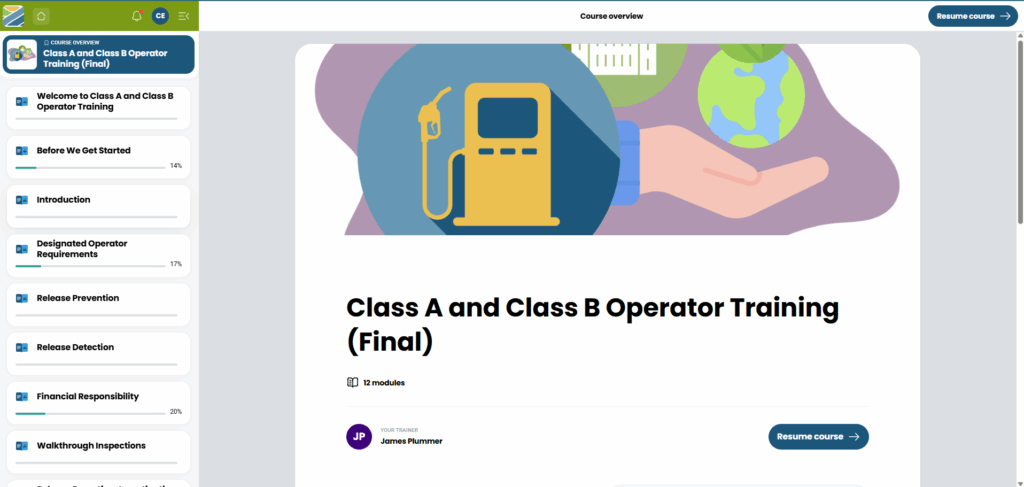
The U.S. Environmental Protection Agency (EPA) Office of Underground Storage Tanks works directly with nearly 200 federally recognized tribes to mitigate the risk of fuel leaks from underground storage tanks (USTs) and support cleanup efforts when necessary. To assist with this work, NEIWPCC collaborated with the EPA to create a free self-paced training course, designed to educate operators in Indian Country about how to properly maintain and operate UST systems.
The course was designed to make training resources more accessible to tribal operators, who are required to adhere to federal UST regulations requirements. One requirement of these regulations is for both Class A and B operators to receive proper training and demonstrate this knowledge within 30 days of assuming their position. Class A operators are the primary individuals responsible for operating and maintaining an UST system (such as facility owners), while Class B operators are responsible for implementing UST regulations on a day-to-day basis (such as facility managers).
“If operators do not know how their systems work, they may not know how to respond to and report any issues,” said NEIWPCC Environmental Analyst James Plummer, who works on the UST/leaking underground storage tank (LUST) program. This can present a public health risk, as fuel leaks that are not addressed in a timely manner can contaminate soil and groundwater supplies.
But some tribal operators have difficulty accessing the training that they need. In-person trainings can be expensive and require traveling long distances, which can prove too costly for owners and employees at independent gas stations. Through its self-paced formatting, this new course allows operators to partake in training on their own time, and from any location nationwide.
“As NEIWPCC has previously created self-paced courses for wastewater training, we had the tools at our disposal to create the same thing for the underground storage tanks community,” said Plummer.
The training begins with an introduction to the regulations surrounding USTs, including which tanks are regulated, why these rules exist, and the training requirements for operators who work with these systems. It then covers more technical aspects of the job including how to prevent, detect, and report releases, demonstrate financial responsibility for potential leaks, perform inspections, and keep up to date records.
At the conclusion of the course, participants are required to take the online operator exam, which tests their knowledge about USTs and the requirements of their job functions. The certification designates that individuals have properly completed the training and know how to maintain compliance with the EPA’s regulations. Additionally, operators who have completed prior training are permitted to take the exam, without having to complete the accompanying course.
While the training was designed to meet the needs of Class A and B operators in Indian Country, it can also be accessed by anyone else who feels that it might be of use to them. This includes Class C operators who are responsible for monitoring the dispensal of petroleum at gas stations. Though not required by law to complete training, the course can still offer valuable tips and resources for any employees who work closely with USTs.
The Class A and B operator training was developed in cooperation with and reviewed by the EPA, as well as members of NEIWPCC’s Tribal UST/LUST workgroups. NEIWPCC is also working on two additional self-paced training courses focused on UST inspections and LUST remediation.
For more information about the self-paced training or NEIWPCC’s involvement in the national tanks program, contact James Plummer at jplummer@neiwpcc.org.